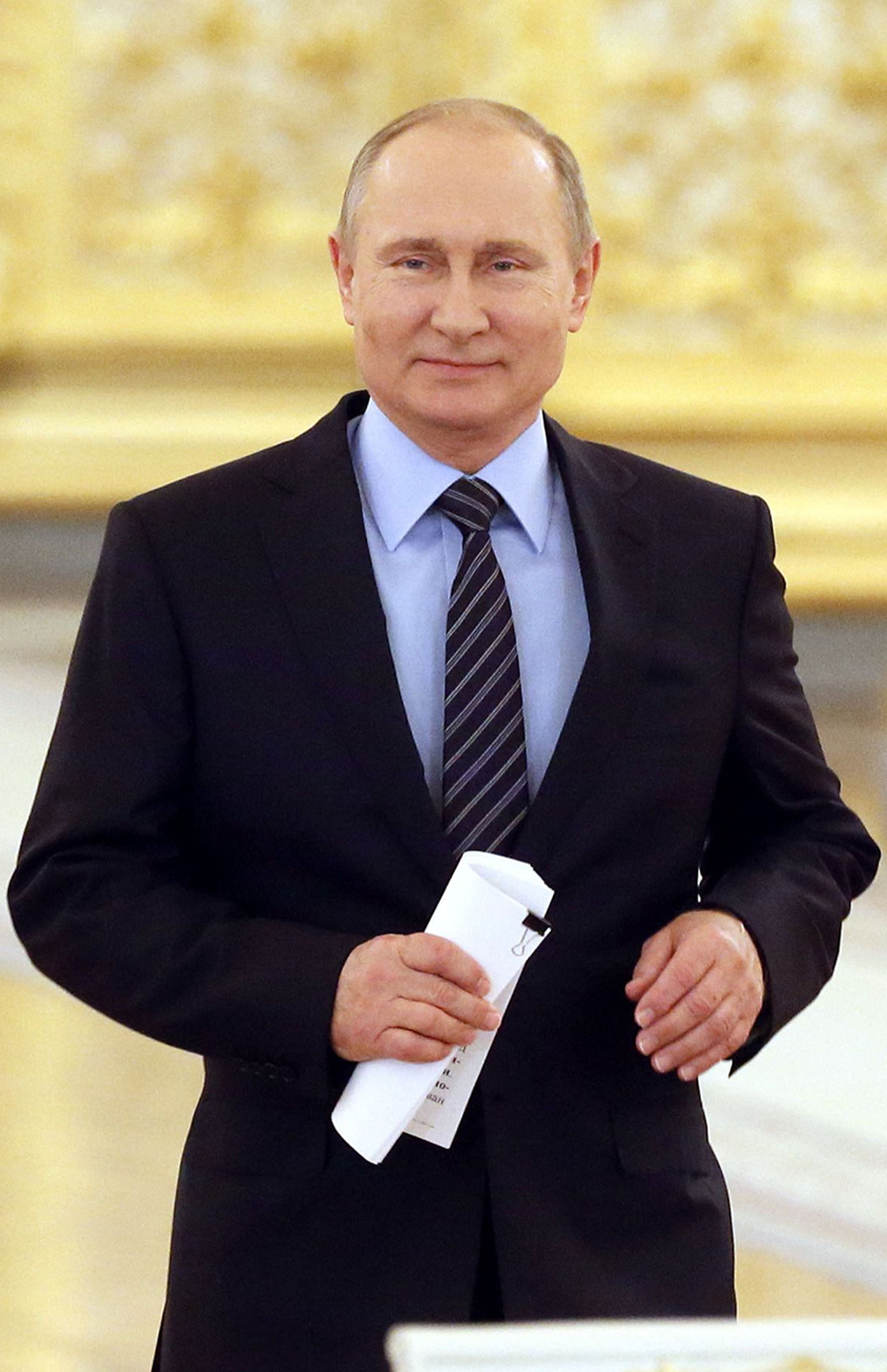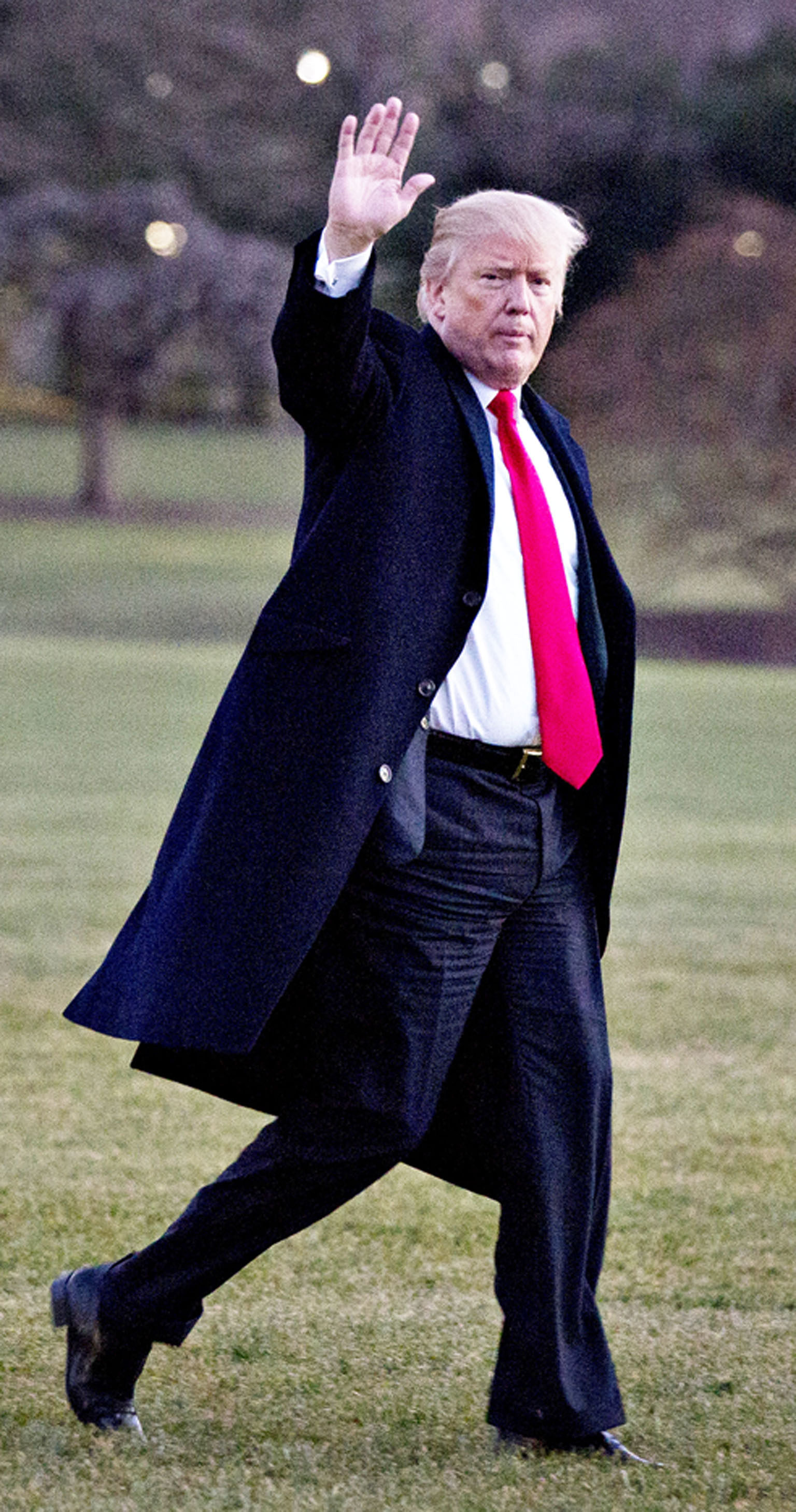Why is Putin contesting as an independent?
Editorial
The Statesman, India
The Kremlin has emitted two critical signals in the span of a week, both designed to reinforce Mr Vladimir Putin's firm geopolitical ground.

Having completed his victory lap in Syria and Egypt, he has announced a substantial pullout of Russian troops from embattled Syria.
"Friends, the motherland is waiting for you," he told the Russian soldiers. "You are coming back home with victory." The starry-eyed euphoria over battlefield honours is now buttressed with the announcement that the President of Russia will run for re-election on March 18 .
The developments are inter-related - the troop pullout in Syria and the next election for president.
Bringing back some of the Russian forces - who are reportedly deployed alongside thousands of Kremlin-connected private contractors - is expected to boost his political prospects.
Russian casualties in Syria are a closely guarded secret, as are the financial costs of the operation. In geopolitical terms, Mr Putin's war in Syria has turned out to be a profitable investment for the Kremlin.
He has exploited the western strategic disarray, most particularly America's reluctance to be drawn deeper into the conflict.
Well might Mr Putin claim the diplomatic high ground. Nonetheless, it is hard not to wonder why he has resolved to contest as an independent - an electoral option that makes his domestic agenda ever so significant. A leader who has been at the helm since 1999, he will be Russia's longest-serving president after Stalin should he win a fourth term - a triumph that seems almost certain. And yet after two decades in the Kremlin, he has not spelt out the reason for the proposed paradigm shift in matters internal.
Chiefly, he is "aiming into the future", primarily to make the country's economy more flexible and enhance its efficiency.
Markedly, he has dispensed with the support of his traditional party, United Russia, to contest as an independent. No party label will guide Mr Putin's governance.
Should Duterte be considered a traitor?
John Nery
Philippine Daily Inquirer, Philippines
Associate Justice Francis Jardeleza used last week's House justice committee hearing on the impeachment complaint filed against Chief Justice Maria Lourdes Sereno to deliver a counter accusation three years in the making: He asserted that it was the Chief Justice, not he, who committed acts of treason during the preparation of the (successful) Philippine arbitral case against China.

He was responding to her erroneous claim, in 2014, that then Solicitor General Jardeleza's policy position on the South China Sea dispute, specifically on Itu Aba in the Spratlys, was disloyal to the country.
Lost in this "spectacle of diminishment", as an Inquirer editorial described the sorry appearance of one retired and three incumbent Supreme Court justices at the hearing, is any appreciation of the present reality: Under President Rodrigo Duterte, and despite the sweeping landmark ruling of the arbitral tribunal last year in favour of the Philippines, the country's rightful claims to the West Philippine Sea - to parts of the Spratlys and to Scarborough Shoal - are at their weakest in decades. Indeed, Mr Duterte has deliberately weakened them. Can he then be accused of committing acts of disloyalty to the country, when all he did was implement a new, accommodationist policy to China?
Official policy has certainly changed under him. It began when he ordered a "soft landing" for the overwhelming Philippine victory at the tribunal. But it has become clear he does not believe in the power of the (compelling) arbitral tribunal decision (or "award") to get itself accepted as a matter of international law. He has said, again and again, that the choice he faces is between implementing the decision and war.
The arbitral tribunal's award itself is proof that there is a third way open to smaller countries: binding international law. Senior Associate Justice Antonio Carpio, in his book on the South China Sea disputes, notes at least three instances where smaller countries were able to extract substantial compliance from Russia, Great Britain and the United States after similar awards.
Mr Duterte, the first lawyer-president since Mr Ferdinand Marcos, does not in fact believe in the power of the law; rather, he believes that law serves power - even if that power emanates from Beijing.
What silences Suu Kyi?
Editorial Desk
The Nation, Thailand
What is the point of Myanmar having Nobel Peace Laureate and one-time democracy icon Aung San Suu Kyi in power as de facto head of state if she cannot - or will not - exercise that power to protect people's basic rights?

The latest abuse occurred last week, spurring further outrage around the world. Two journalists working for news agency Reuters - both Myanmar citizens - were arrested for trying to report on the plight of the Rohingya minority.
They could each face 14 years in jail.
It can only be assumed that the government knows the information exchanged is so damning that it had to silence the journalists and officials taking such brave steps to alert the world about the true nature of what is happening in Rakhine. The United Nations and United States have already agreed that attacks on the Rohingya by government forces and vigilante groups amount to ethnic cleansing. Since late August, more than 650,000 people have fled across the border into Bangladesh in fear of their lives.
Ms Suu Kyi's government is cowering from the international spotlight. It bars aid workers, foreign journalists and other investigators from travelling independently in the strife-torn western state.
The authorities of Myanmar have a long history of hiding atrocities, predating Ms Suu Kyi's rise and perhaps learnt from British colonialists. The problem today is that Ms Suu Kyi appears uninterested in breaking that habit.
Goodbye to year dominated by Trump
Martin Khor
The Star, Malaysia
What a year it has been! As 2017 slips away, many wonder if the world will ever be the same.

Credit or blame goes mainly to United States President Donald Trump for this radical change. For the past year, he has ruled as if he were catering to his extreme right voter base.
Mr Trump's policies have been in line with implementing his America First inauguration slogan, which really meant the America of his voter base, and also a sentiment of "why should we bother about the rest of the world?" .
Broad-minded Americans (who increasingly include many Republicans) were aghast. And the rest of the world was outraged by one policy after another.
The year ended with two more shocks. First, Mr Trump announced that the US recognises Jerusalem as the capital of Israel, going against the official United Nations position and sparking protests and outrage across the world.
This move, planned by his son-in-law and not the US State Department, destroyed any remaining hopes, if any, of a solution to the Palestine-Israel conflict.
Second, the US brought its antagonism towards the present trading system to the ministerial conference of the World Trade Organisation (WTO) held last week in Buenos Aires.
Its entrenched position, refusing to recognise the WTO's 16-year-old Doha agenda, or to honour a previous ministerial commitment to create a permanent solution to a food security issue (known as public stockholding), or to acknowledge the principle and new proposals for special treatment of developing countries, was the main reason why the conference ended without the traditional declaration.
The biggest fear is that, by design or accident, conflict may break out between the US and North Korea, escalating into a nuclear war. If at least this can be avoided, we can thank our lucky stars. So low have expectations of the world order fallen.
- The View From Asia is a compilation of articles from The Straits Times' media partner, Asia News Network, a grouping of 23 news media entities.

